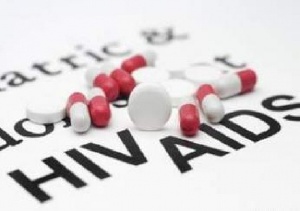Dr. Anthony Ashinyo, the Volta Regional HIV and Tuberculosis Coordinator, has said HIV is no longer a “death sentence” and urged individuals to get to know their status and seek support when they test positive.
He said people put on antiretroviral medications could live for more than 50 years thereafter, and challenged the public to welcome the “Know Your Status Campaign.”
Medical scientists globally now frame HIV as a treatable chronic manageable disease.
Dr Ashinyo was addressing the Volta Regional Consultative Meeting of the Ghana AIDS Commission’s “First 90 Campaign,” in Ho.
The Ghana AIDS Commission (GAC) is embarking on a one-year campaign to achieve the “First 90 Fast-Track” target to ensure that 90 per cent of all persons living with HIV know their HIV status.
The First 90 Fast-Track target, which is part of a broader UNAIDS Global Strategy, is ultimately to end AIDS by 2030, but this requires that countries set short-term targets for 2020 to allow for the tracking of progress towards achieving the global long term goal.
These short term targets are popularly called the “90-90-90 Fast Track Targets,” meaning that 90 per cent of all People Living with HIV (PLHIV) would know their status; 90 per cent of all people diagnosed with HIV infection would receive sustained Antiretroviral Therapy (ART), while 90 per cent of all people receiving antiretroviral therapy would have viral suppression.
The stakeholder meeting was, therefore, to provide a platform to engage stakeholders on modalities towards implementing the “First 90 Campaign” and its linkages to the other two 90s in the context of Ghana’s strategic plan 2016-2020.
Dr Ashinyo said though HIV was “well established” in the country with “no where cool”, drugs and support systems were available to make life worth living.
He noted, referring to 2014 sentinel survey, that due to fear and panic associated with testing positive, people refused to get tested to know their status.
Only a little over 13,000 out of the estimated 52,726 people living with HIV in the Volta Region knew their status, he said.
The figure, he explained, represented 2.2 per cent of the population of the Region, which was higher than the national prevalence of 1.37 per cent.
He said ignorance, lack of access to HIV Testing Services in communities and the motivation of personnel were major challenges to the campaign and called for support to address these.
Dr Ashinyo also called for the integration of HIV programmes into health promotion activities of the Ghana Health Service.
Madam Rita Afriyie, the Technical Coordinator, Ghana Aids Commission (GAC), said knowing one’s status was an “entry point to prevention and treatment.”
She challenged the Volta Region to be innovative and roll out strategic plans to achieve the campaign for many people to know their status.
“Volta must be innovative, roll out plans for people to know their status,” she said. “Don’t wait for the Commission. Don’t expect funding from the Commission. Contact stakeholders locally”.
Dr Angela El-Adas, the Director General, GAC, in a speech read on her behalf said the Commission was working on a new National Strategic Plan to provide guidance and direction with focus on “action and resources.”
She said the “First 90 Campaign” was to create awareness about the availability of HIV testing services and encouraged Ghanaians to know their status and reduce the stigma and discrimination.
Mr Francis Ganyaglo, the Deputy Volta Regional Minister, asked the Commission to ensure the availability of test kits to encourage people to know their status.
He also urged the media and other stakeholders to work towards reducing stigma and discrimination for a successful campaign.
Health News of Thursday, 2 June 2016
Source: GNA

















